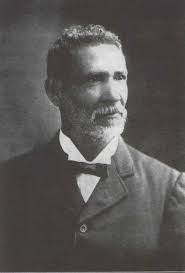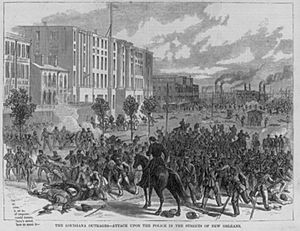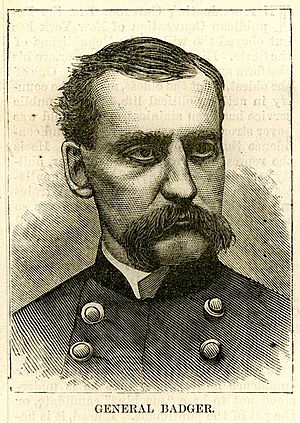Rodolphe Desdunes facts for kids
Quick facts for kids
Rodolphe Lucien Desdunes
|
|
|---|---|
 |
|
| Born | November 15, 1849 New Orleans, Louisiana, U.S.
|
| Died | (aged 78) Omaha, Nebraska, U.S.
|
| Alma mater | Straight University |
| Occupation | Customs Officer, Journalist, Historian |
| Political party | Republican |
| Spouse(s) | Mathilde Cheval Denebourg Clementine Walker |
Rodolphe Lucien Desdunes (born November 15, 1849 – died August 14, 1928) was an African-American leader. He worked for civil rights, wrote poems and history, and was a journalist. He also worked as a customs officer. He was mostly active in New Orleans, Louisiana.
During the time after the Civil War, called the Reconstruction era, he was a soldier in Louisiana. He took part in the Battle of Liberty Place. Later, he was a member of a group called L'Union Louisianaise. He wrote for their weekly newspaper. He also wrote for a daily paper called the Crusader. He taught at the Couvent School in New Orleans.
In 1890, he helped start the Comité des Citoyens. This group fought against a law called the 1890 Separate Car Act. They took legal action, which led to a famous case in the U.S. Supreme Court. This case was Plessy v. Ferguson (1896). Desdunes also wrote an important book in French. It was about Creoles in America. The book was called Nos Hommes et Notre Histoire. It was the first book like it written in French by a Louisiana Creole of Color.
Later in his life, he moved to Omaha, Nebraska. His son Daniel lived there.
Contents
Early Life and Family
Rodolphe Lucien Desdunes was born on November 15, 1849. He was one of at least five children. His parents were Pierre Jérémie Desdunes and Henriette Angélique (Sonty) Gaillard. His brothers were Pierre Aristide, Joseph, Elmore, and Sarazin.
His father, Pierre, lived in New Orleans by 1840. He was likely born in the city. The Desdunes family were Saint Dominican Creole refugees. They came from Saint-Domingue (now Haiti) during the 1791 Haitian Revolution. They found safety in New Orleans. Rodolphe probably learned from his family and friends. These friends included Armand Lanusse and Joanni Questy. He also went to the Couvent School.
Rodolphe's brother, Pierre Aristide, also worked for civil rights. He was a poet, cigar maker, and carpenter. He owned a tobacco farm. He fought in the American Civil War. Aristide was on the board of directors for the Couvent School. This school was started by Marie Couvent in 1848. In 1873, Aristide married Louise Mathilde Denebourg.
Rodolphe married Mathilde Cheval. They lived with her mother, also named Mathilde. Before 1880, they had children. These included Daniel (born around 1873), Agnes (around 1873), Louise (around 1874), Coritza (born in 1876), and Wendelle (born in late 1876 or early 1877).
In 1879, Rodolphe had children with Clementine Walker. She was born in 1860. They had at least four children: Mary Celine (born March 25, 1879), John Alexander (1881), Louise (1889), and Oscar Alphonse (1892). Clementine died on September 23, 1893. Mary Celine became known as Mamie Desdunes. She was a blues pianist.
Oscar, another of Rodolphe's sons, was also a musician. After his nephew Clarence died in 1933, Oscar played with his band, the Joyland Revellers. Rodolphe had three other daughters, possibly with Clementine. Their names were Edna, Lucille, and Jeanne (born around 1893).
Public Service and Politics
Militia Service
In the early 1870s, during the Reconstruction period, Desdunes was part of the New Orleans Police Department. In 1874, he was hurt in the Battle of Liberty Place. This battle was between forces supporting the Republican party and a group called the White League. The White League was mostly former Confederate soldiers. Desdunes strongly supported the rights of black veterans from the U.S. Civil War.
Education and Government Work
Desdunes started studying law at Straight University in the early 1870s. He earned a law degree from Straight University in 1882.
In 1879, Desdunes became secretary of a local committee. He was also an active member of the Odd Fellows, a social group. He translated their rules into French.
He was very involved in Republican politics. In 1891, he was chosen as secretary of the Republican state committee in Louisiana. He often spoke at Republican events. In 1892, he asked black people to support more moderate candidates. He stayed on the Republican Committee until 1900.
From 1870 to 1885, Desdunes worked for the U.S. Customs Service in New Orleans. He was a messenger and a clerk. He also worked there from 1891 to 1896, and from 1899 to 1912. In 1880, he became assistant cashier at the New Orleans Customhouse. This was under Collector Algernon Sidney Badger. In 1891, Desdunes became chief clerk of the sub-treasury in New Orleans.
In 1908, while working for the Customs department, granite dust blew into his eyes. This caused him to become blind. He retired the next year. He then moved to Omaha, Nebraska to live with his son, Daniel. Daniel was a musician and activist there.
Fighting for Civil Rights
In the 1870s, Desdunes joined the Young Men's Progressive Association. This group worked for black rights. After 1877, many federal troops left the South. This made it easier for white groups to stop black people from having their rights. In 1878, Desdunes and his group spoke out against lynchings. Many black people had been killed in Louisiana in the 1870s.
In 1884, Rodolphe and his brother, Aristide, helped reopen the Couvent School. They were part of a group called L'Union Louisiannais. Both brothers were on the school's board. Rodolphe also taught there. In 1887, a French newspaper called L'Union Louisiannais started in New Orleans. Rodolphe Desdunes was the recording secretary for the paper. In 1889, a Republican newspaper called the Crusader was started. Desdunes wrote for it often. The Crusader was published in both French and English. It supported civil rights.
Desdunes was part of the American Citizens' Equal Rights Association of Louisiana in 1890. They protested to the state government. They were against laws that treated black people as second-class citizens. He also wrote for other newspapers in Louisiana.
The Comité des Citoyens and Plessy v. Ferguson
Desdunes was very upset by the 1890 Separate Car Act. This law forced black and white people to use separate train cars. In 1891, he wrote in the Crusader that it was "a slap in the face of every member of the black race." Rodolphe, his son Daniel, his brother Aristide, and others formed the Comité des Citoyens. This group worked to fight for black civil rights.
Rodolphe asked his oldest son, Daniel, to break the law. This was so they could challenge it in court. On February 24, 1892, Daniel got on a train going to Mobile, Alabama. He was arrested in New Orleans. However, Judge John Howard Ferguson said the law could not be used for travel between states. This is because only the federal government can control travel between states.
So, the Comité tried again. This time, they focused on travel within the state. Homer Plessy volunteered to break the law. Plessy was arrested. The Comité members helped him get out on bail. The case, Plessy v. Ferguson, went all the way to the U.S. Supreme Court in 1896. The Court decided that Plessy's rights were not violated. Desdunes wrote that their defeat "sanctioned the odious principle of the segregation of the races." After this, the Comité and the Crusader newspaper both stopped their work.
Historian and Poet
| To the French High Commission (Hommage de la population de couleur/ tribute from the coloured people.) Messieurs: Vous, defenseurs du droit et de la libert[é]; Des humbles descendants de la race Africaine, Veuillez bien accueillir l'hommage merit[é] Nous, aussi, nous voulons temoigner a la France, Au nom de l'avenir, du present, du pass[é], Nos sinceres souhaits, notre reconnaissance, Tel que, de tous les temps, notre ame la pense. Nous avons admir[é] l'illustre Lafayette, Le Divin Lamartine et le sublime Hugo, De nos Dumas, la France est seule qui s'inquiete, Qui, par amour du bien, sait consacrer le beau. Rodolphe Desdunes |
Desdunes was very interested in the history and art of Creoles in Louisiana. Before he lost his sight, Desdunes finished a book. It was about the contributions of Creoles to Louisiana history. The book was called Nos Hommes et Notre Histoire. It was published in Quebec in 1911.
In the book, Desdunes shares his own memories. He also writes about the lives of important men. These men were involved in writing, art, music, war, peace, and teaching. The story begins with the role of free black soldiers. They fought under General Andrew Jackson in the Battle of New Orleans in the War of 1812. The book then continues to explore how Creoles helped Louisiana and the United States. It also talks about the unfair treatment these men and all black people faced.
In Omaha, he kept writing poetry. He sent his poems to different places. He also became close to other black people in Omaha. One person was Father John Albert Williams. He called Desdunes "Omaha's Blind Negro Poet" in the Omaha World-Herald newspaper. His poems in the Herald included praise for black soldiers in World War I. He also wrote "To the French High Commission" and a tribute to Nebraska called "Aksarben, Eloge." Both of these poems appeared in 1917.
Death
Rodolphe Desdunes lived in his own house in Omaha with his wife. He died on August 14, 1928. He passed away from cancer of the larynx. His body was sent to New Orleans. He was buried in a family tomb in St. Louis Cemetery No. 2.
Images for kids
-
The "Louisiana Outrages", as illustrated in Harper's Weekly, 1874. Clash between the (racially integrated) Police and the (segregationist) White League on Canal Street
See also
 In Spanish: Rodolphe Desdunes para niños
In Spanish: Rodolphe Desdunes para niños
 | Janet Taylor Pickett |
 | Synthia Saint James |
 | Howardena Pindell |
 | Faith Ringgold |





